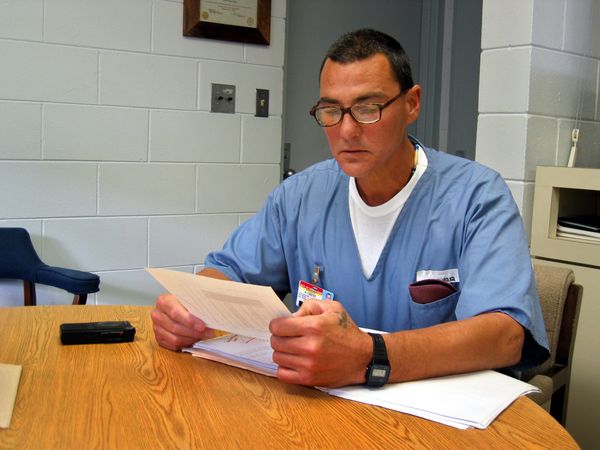
Frank Gable in a Florida state prison during an interview with reporters from The Oregonian in 2005. (Photo courtesy The Oregonian/OregonLive)
A Salem man imprisoned for the 1989 murder of Oregon’s prisons director may go free in about 90 days after a federal magistrate concluded his trial was flawed.
Frank Gable was convicted in 1991 for stabbing to death Michael Francke, then director of the Oregon Department of Corrections. Prosecutors said Francke was stabbed after he caught Gable prowling Francke’s car outside the Corrections Department’s Dome Building office.
In a 94-page ruling Thursday, U.S. Magistrate John Acosta catalogued how witnesses who providing incriminating testimony against Gable later recanted. He also said Gable was improperly blocked from introducing evidence another man was guilty of the murder.
“The court concludes it is more likely than not that no reasonable jury would find Gable guilty,” the ruling said.
Document: Federal court ruling
Acosta concluded his order by directing that “Gable shall be released from custody unless the state of Oregon elects to retry him within 90 days.”
Gable was tried by the Marion County District Attorney’s Office and his appeals have been handled by the state Justice Department.
The case has generated controversy from the start. Gable has always maintained his innocence and Francke’s two brothers, Kevin and Patrick, eventually became advocates for his exoneration.
Conspiracy theories have swirled around Francke’s death since his body was found. The most prominent was that he was uncovering widespread corruption within the Corrections Department, and he was murdered to stop his work.
Acosta recounted the murder as presented at Gable’s trial. Francke was last seen alive at the Corrections Department office just before 7 p.m. on Jan. 17, 1989. Witnesses found his car door open but he was nowhere around and didn’t respond to pages.
Later that night, a security guard found Francke, dead, on the north portico of the Dome Building.
“The blood spatter and other physical evidence showed that Francke climbed the steps of the north portico, unsuccessfully attempted to open the door by breaking a pane of glass in the door, and then died on the porch,” the court ruling said.
Gable was indicted in April 1990 for the murder and was convicted by a jury the following year. He was sentenced to life in prison without parole.
He appealed his conviction in state courts, but it was the appeal filed in federal court by federal public defenders in 2007 that led to Thursday’s order.
Acosta recounted in detail the testimony of witnesses that helped convict Gable and their later recantations. This included two who said they had seen the murder – Cappie Harden and Jodie Swearingen.
The ruling said the recantations “share a common theme: the use of similar coercive interrogation tactics and polygraph examinations to secure their incriminating statements.”
Harden, in an affidavit recanting his testimony, said he was questioned repeatedly by the Oregon State Police, which led the investigation into Francke’s murder.
“I initially told the truth, which was that I was not an eyewitness to the Francke murder,” according to his affidavit cited in the ruling. “However, after the police threatened me and my family I eventually adopted the false story.”
Swearingen was given several polygraph examinations, sometimes several times in a single day.
“She says she would tell them the truth and they would say she was lying, and that when she told them what they wanted to hear, they said she was telling the truth, when in fact it was a lie,” the ruling said.
The ruling noted that an expert in polygraph examinations, David C. Raskin, found multiple flaws in how polygraphs were used in the Francke investigation. He was troubled by the treatment of Swearingen.
“I have never seen this many tests administered to one person in the 43 years I have been working in this field,” he said in an affidavit cited in the ruling.
Acosta said the recantations came over time.
“None of the recanting witnesses are related to Gable, but instead were merely acquaintances of Gable in the drug and criminal world of Salem over two decades ago,” the ruling said. “Many of the recanting witnesses had an antagonistic relationship with Gable at the time of their testimony.”
The ruling also recounted the early confession of John L. Crouse, who described to police how he had been burgling Francke’s car when he was caught. He described an ensuing fight, punches, and finally his stabbing of the prisons chief.
“Crouse knew a plethora of physical details about events immediately before, during, and immediately following the altercation that he could not have known unless he killed Francke,” the ruling said.
“Crouse gave conflicting stories and ultimately recanted his confession to investigators, but at least four factors support the reliability of Crouse’s confession,” the ruling said, including his admission to four other people that he killed Francke.
Acosta concluded that “Gable has presented sufficient evidence of a constitutional violation that probably resulted in the conviction of someone who is actually innocent.”
TRY A FREE SAMPLE – You can see for yourself the kind of local news reporting brought to you by the team of professional reporters at Salem Reporter. You can read us for free for 30 days. Signing up is easy and gives you 24/7 access to our reports. Sign up HERE.









